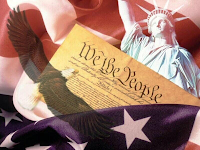
by Don Harkey
The feedback from the articles this week has been tremendous! I have gotten a few questions about why I chose this topic on a blog that is written for leaders. The quick answer is that our country needs some great leadership right now. The other answer is that its a topic that I (and many others) feel pretty passionate about right now.
When it comes down to it, I think the thing that really urks me is how little faith our government has in "we the people". Both parties spent a lot of time talking about "combating greed" in all of its forms while discussing policies centered on "saving" the American people. I hear it everyday. "We must make sure that we have an American auto industry." "We must make sure that Americans have jobs."
That is very, very wrong.
The spirit of America is not only alive and well, it continues to thrive. I talked to a coffee shop owner ("The Buzz" in Springfield, MO) yesterday who started her shop in December of last year, in the middle of the economic crises. My friend asked her if she was nervous starting up a shop in the middle of a recession. She responded, "at least I have control of my destiny". She then told us about the homemade baked goods and other foods. The carrot cake was incredible!
Also this week, a friend of mine forwarded a link with information on a new electric car that is being made by the American auto industry. Who is it? Ford? GM? Chrysler? Nope. Tesla Motors.
Today, I'm visiting with the owners of a recently started and growing cabinet company called "Cabinet Concepts by Design". Isn't the housing market down? They are focused on innovative custom designs presented in a way that every homeowner can see (in a 3D computer model).
A couple of weeks ago, I attended the ribbon cutting at "Swing Right Golf". Sean Saunders has been working on his PGA license while building his business, all in the middle of this poor economy. Read more about Sean on the "Move Blog".
Last month, I met James Olson who owns "Oaxcafe Coffee Company" who roasts coffee in Springfield for many of the local coffee shops. In these tough economic times, is James holding onto his profits to ensure his survival? No. Instead he regularly goes on mission trips to Mexico and India.
Yesterday, I talked with Kent who directs "Therapeutic Riding of the Ozarks", an agency that gives special needs children the chance to ride horses. The therapeutic effect on the kids is dramatic. He further reaches out to children by using at risk teenagers to work with the kids changing the lives of everyone involved. He works 18 hours a day keeping his operation going which is funded by grants and donations.
It is time that the government stop treating the American People like victims. It is time that we remember that these people are the ones who will lead us out of these economic times. While it is true that stupid decisions by a few overpaid executives and government officials can lead us into a recession, it is also true that our system of government allows the people to pull us out of it.
The United States leads the world economically, not because of government policies, but because of the freedom enjoyed by the entrepreneurs and "do-ers" of this country. These people innovate, create value for society, and are rewarded for doing so. In fact, we are all rewarded by these people.
My suggestion is this... turn off the news, donate to your favorite charity or church, go get a cup of coffee and think about all of the opportunities that living in this country offers you. Think about what others have done with that opportunity and then imagine what YOU will do with it. Don't surrender your destiny!





.bmp)




